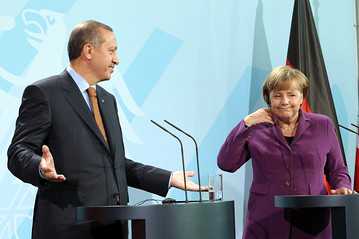By Emre Peker
ISTANBUL — There was a time when joining the European Union was Turkey’s most-prized goal. Now, Turks don’t want to go anywhere near the bloc.
Support for joining the EU has dropped to a record low of 17% from 34% last year, according to a survey published Tuesday by the Turkish European Foundation for Education and Scientific Studies, or Tavak. What’s more, almost 80% of the 1,110 people polled in eight cities across Turkey in June said they didn’t believe Turkey would join the 27-nation bloc.

European Pressphoto Agency
German Chancellor Angela Merkel and Turkish Premier Recep Tayyip Erdogan on Nov. 2, 2011. Before that meeting, in a newspaper interview Mr. Erdogan accused Germany of blocking Turkey’s entry to the EU.
At the heart of it is Turkey’s strong economic growth, contrasting with the EU, which has seesawed in and out of recession amid a financial crisis during the past three years, said Faruk Sen, chairman of Tavak. Also fueling sentiment against joining the EU are repeated snubs from EU leaders against Turkish entry to the bloc and a feeling that the union is anti-Islam, he said in an interview on Wednesday.
“From now on, the EU will have to coddle Turkey, be more hands-on. Turkey is developing alternatives,” Mr. Sen said. “Think of it this way, a man doesn’t think of an alternative to a wife he very much loves, but if the woman withdraws, then the husband looks for alternatives.”
Analogies of failed marriages aside, Turkey has indeed been deepening trade ties with the Middle East and North Africa in the past five years. While the EU is still Turkey’s biggest export market, its share of the pie is falling fast.
As Turkey’s sales abroad have been growing at a healthy clip — reaching a record $135 billion in 2011 — the EU’s share shrunk to 46% in 2011 from 56% in 2007, according to the state statistics agency. As of June, Turkish businessmen had cut their sales to the EU to 39% while boosting exports to the Middle East and North Africa to 36%, up from 28% in 2011.
Turkish Prime Minister Recep Tayyip Erdogan had made EU membership a priority after his party came to power in 2002 and clinched accession talks with the bloc in 2005. At the time, support for joining the union had peaked at 78%, Tavak’s Mr. Sen said, citing another survey.
However, the thrust behind membership negotiations cooled as Mr. Erdogan grew more confident on the back of an average annual economic growth rate of 5.5% in the past decade, increased Turkey’s clout in the Middle East after spats with Israel, and used EU reforms to remove the military’s iron grip on politics.
Indeed, of the 35 chapters that must be negotiated to complete Turkey’s accession only 13 have so far been opened. And, for the past two years, there has been no progress, according to the EU’s enlargement website. Turkey’s EU Affairs Ministry wasn’t immediately available for comment.
However, despite waning enthusiasm in Turkey to join the EU, lack of progress in negotiations and the bloc’s shrinking importance as an export market, trade and investment ties will remain large, said Robert O’Daly, a senior analyst at the Economist Intelligence Unit in London.
“Things have definitely changed since the negotiations started. While Turkish support to join the EU is extremely low, it’s not surprising given the problems in Europe and Turkey’s greater self confidence, both economically and politically,” Mr. O’Daly said Wednesday.
Still, after years of work toward a union, the EU and Turkey are unlikely to pull the plug on the negotiations, regardless of low public support, according to Mr. O’Daly. “I don’t think it is the end of the road … the talks will officially remain in place, and on-and-off there are going to be stronger contacts, but I don’t see any real progress being made.”
via Turks to European Union: No, Thanks – Emerging Europe Real Time – WSJ.

Leave a Reply